When it comes to your beloved Poodle's well-being, the significance of nutrition cannot be overstated. Have you ever wondered how the food you provide impacts every aspect of your Poodle's health? From their shiny coat to their energy levels, nutrition plays a pivotal role in ensuring they lead a happy and healthy life. But what specific nutrients are crucial for your Poodle's optimal health? Let's explore the essential elements that contribute to your Poodle's overall well-being and vitality.
Key Takeaways
- High-quality proteins are vital for muscle health and development in Poodles.
- Balanced diets with essential nutrients support overall well-being and immune function.
- Portion control is crucial for weight management and preventing obesity.
- Specialized puppy formulas and proper nutrition ensure long-term health and growth in Poodles.
Poodle Nutritional Requirements Overview
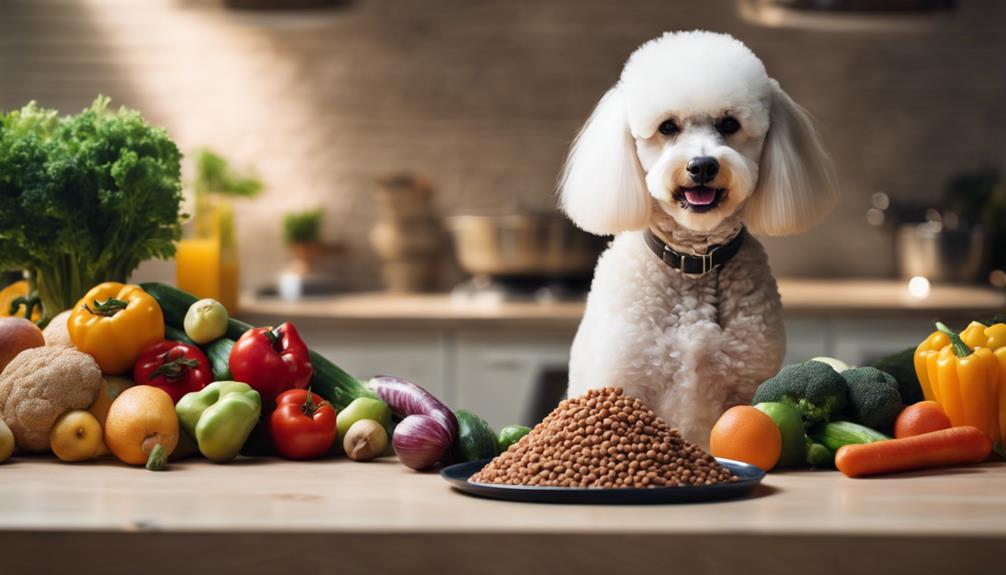
When considering the nutritional requirements of Poodles, high-quality proteins are essential for optimal muscle health and development. Poodles, like all dogs, require a balanced diet to support their overall health. A diet rich in nutrients such as proteins, fats, carbohydrates, vitamins, and minerals is crucial for Poodle well-being. To ensure your Poodle maintains a healthy weight and receives the necessary nutrients, portion control is key.
Providing your Poodle with a well-rounded diet that includes high-quality proteins from sources like lean meats, fish, and eggs is essential for muscle maintenance and growth. Additionally, essential fats such as Omega-3 and Omega-6 are vital for providing energy and maintaining a healthy coat. Digestible carbohydrates from sources like sweet potatoes and oats are excellent sources of energy for your Poodle.
Incorporating all these nutrients into your Poodle's diet in appropriate portions will help ensure they lead a healthy and active life. Remember, a balanced diet and portion control are the pillars of good nutrition for your beloved Poodle.
Protein Importance for Poodles
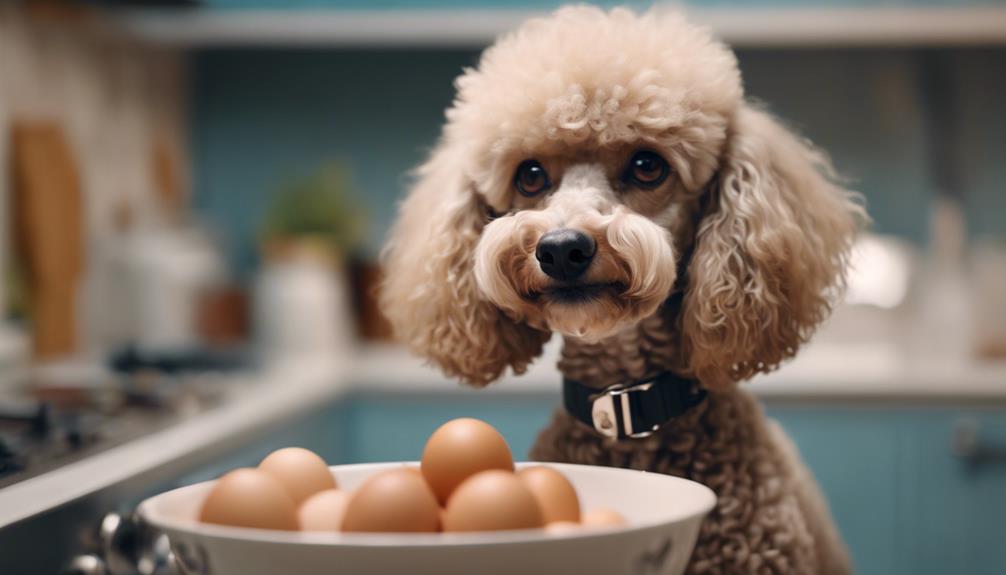
Protein plays a crucial role in supporting muscle development and repair in Poodles, essential for their active lifestyle and overall health. High-quality protein sources, such as real meat (e.g., chicken, beef, fish), are vital components of a Poodle's diet to ensure they meet their protein requirements. Adequate protein intake not only aids in maintaining a healthy weight but also promotes the development of lean muscle mass, contributing to optimal body condition in Poodles. Throughout different life stages, from puppyhood to adulthood, a protein-rich diet is essential for proper growth and sustaining muscle strength. By consuming balanced amounts of protein, Poodles can enhance their energy levels, support immune function, and overall well-being. Therefore, incorporating protein from real meat sources into their meals is fundamental for Poodles to thrive physically and enjoy their active lifestyle.
Role of Healthy Fats in Poodle Diet

Healthy fats, such as Omega-3 and Omega-6, play a crucial role in your Poodle's diet. Omega-3 fatty acids are essential for supporting coat health, brain function, and joint health. Ensuring a proper balance of these healthy fats in your Poodle's diet can contribute to their overall well-being and vitality.
Importance of Omega-3
Incorporating sources rich in Omega-3 fatty acids into a Poodle's diet is essential for reducing inflammation, supporting heart health, maintaining a shiny coat, and promoting cognitive function and joint health. Omega-3 fatty acids, found in fish oil, flaxseed, and chia seeds, play a crucial role in maintaining overall health in Poodles. These healthy fats help in reducing inflammation, which is beneficial for heart health and immune function. Additionally, Omega-3 fatty acids contribute to a lustrous coat and healthy skin. By maintaining a balanced ratio of Omega-3 to Omega-6 fatty acids, cognitive function and joint health can be improved. Ensuring your Poodle receives an adequate amount of Omega-3 in their diet can prevent skin issues, allergies, and promote their longevity and well-being.
Benefits for Coat
To maintain a vibrant and healthy coat in your Poodle, ensuring a proper balance of essential fatty acids like Omega-3 and Omega-6 in their diet is crucial. These healthy fats play a significant role in promoting coat health, skin health, and a shiny coat while helping reduce shedding. Incorporating sources rich in Omega-3 and Omega-6 fats supports a soft, silky coat that is less prone to tangling and matting. By providing your Poodle with the right amount of these essential fatty acids, you can enhance the quality and appearance of their coat, giving them a lustrous and healthy look.
| Benefits of Healthy Fats in Poodle Diet | |
|---|---|
| Promotes shiny, lustrous coat | Supports skin health |
| Reduces shedding | Prevents dryness and irritation |
| Enhances coat quality | Lessens matting and tangling |
Brain Health Support
In optimizing your Poodle's cognitive function and neural development, a well-balanced diet rich in essential fatty acids such as Omega-3 and Omega-6 plays a crucial role. These healthy fats are vital for brain health support in Poodles as they contribute to cognitive function and neural development. Adequate intake of Omega-3 and Omega-6 fatty acids is essential for maintaining mental acuity and overall brain health in your furry companion. Including dietary sources of healthy fats in your Poodle's meals can significantly promote brain function and sharpness. Omega-3 fatty acids, commonly found in fish oils, specifically play a role in enhancing cognitive well-being, making them a valuable addition to your Poodle's diet for optimal brain health support.
Optimal Carbohydrates for Poodles
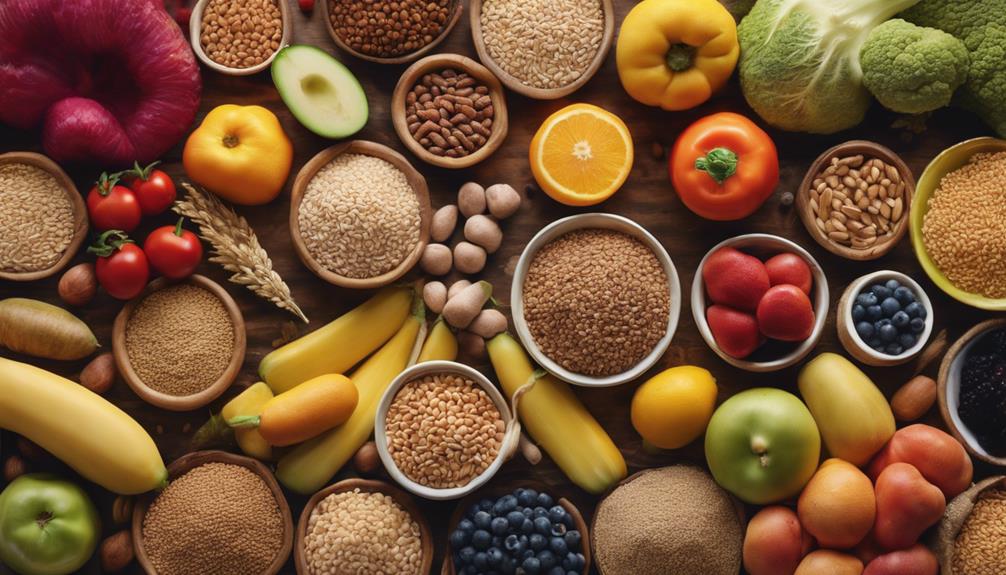
Benefiting Poodles with sustained energy levels and digestive health, optimal carbohydrates like sweet potatoes, brown rice, and oats play a crucial role in supporting their overall well-being.
- Complex Carbohydrates: Sweet potatoes, brown rice, and oats are rich in complex carbohydrates, providing a gradual release of energy that helps Poodles stay active throughout the day.
- Digestive Health Support: The fiber content in these carbohydrates aids in digestion, promoting a healthy gut environment and preventing issues like constipation in Poodles.
- Blood Sugar Regulation: Optimal carbohydrates help regulate blood sugar levels in Poodles, reducing the risk of spikes and crashes that can impact their health and well-being.
- Nutrient Absorption: Including nutrient-rich carbohydrates in Poodles' diet enhances the absorption and utilization of essential vitamins and minerals, contributing to their overall health and vitality.
Vitamins and Minerals for Poodle Health
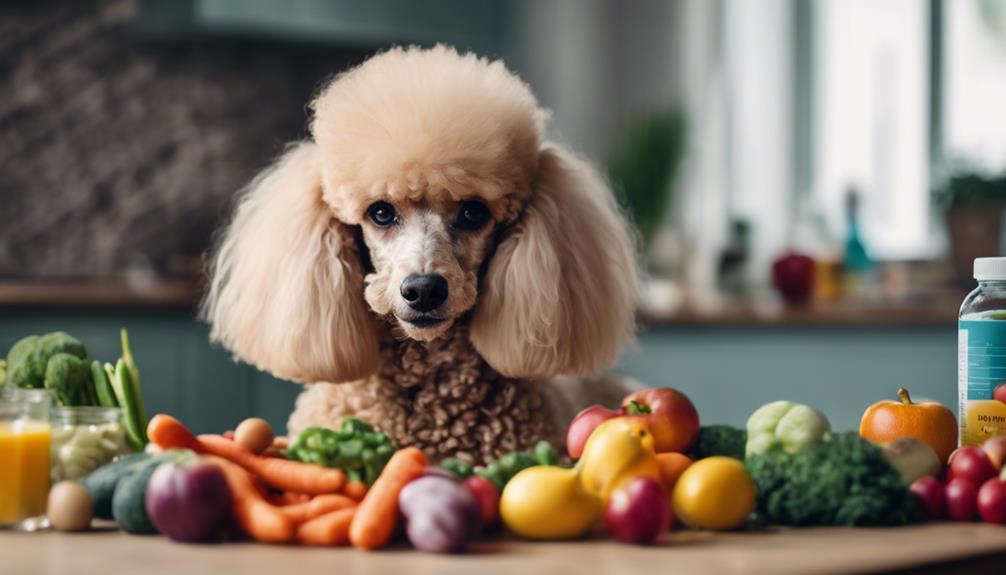
To ensure optimal health for your Poodle, it is crucial to provide them with essential vitamins such as A, B, D, and E, which play vital roles in immune function and overall well-being. Additionally, minerals like calcium, phosphorus, and zinc are necessary for maintaining strong bones, healthy teeth, and skin condition in Poodles. Striking a balance in your Poodle's diet to include these key vitamins and minerals is paramount for supporting their longevity and ensuring their vitality.
Essential Vitamins for Poodles
Why are essential vitamins and minerals crucial for maintaining optimal health in Poodles? Poodles, like other dogs, require specific nutrients to thrive. Here are four key vitamins and minerals that play a vital role in your Poodle's health:
- Vitamin A: Essential for vision health and immune function.
- Vitamin B complex: Aids in energy production, nerve function, and red blood cell formation.
- Vitamin C: Supports collagen production, skin health, and antioxidant defense.
- Vitamin D: Crucial for calcium absorption, bone health, and immune system regulation.
Ensuring your Poodle receives these essential nutrients in their diet is fundamental to promoting their overall well-being and longevity.
Key Minerals for Poodles
Poodles require a balanced intake of key minerals to support various physiological functions essential for their overall health and well-being. Calcium is crucial for bone strength and muscle function, while phosphorus is vital for energy metabolism and cell structure. Iron plays a significant role in oxygen transport and overall vitality, zinc supports immune function, wound healing, and skin health, and copper is necessary for growth, bone development, and coat pigmentation in Poodles.
| Mineral | Function | Importance for Poodles |
|---|---|---|
| Calcium | Bone strength, muscle function | Essential |
| Phosphorus | Energy metabolism, cell structure | Crucial |
| Iron | Oxygen transport, overall vitality | Vital |
Balancing Nutrients for Poodles
Balancing essential nutrients, including vitamins and minerals, is critical for maintaining optimal health and well-being in Poodles.
- Poodles require essential vitamins like A, B, D, and E for overall health and immune function.
- Minerals such as calcium, phosphorus, and zinc are crucial for bone health and metabolic functions in Poodles.
- The balance of vitamins and minerals in Poodle diets supports skin, coat, and organ health.
- Adequate intake of vitamins C and E helps in fighting oxidative stress and promoting heart health in Poodles.
Ensuring a healthy and balanced diet rich in essential nutrients like vitamins and minerals is key to promoting skin health, coat health, and overall well-being in Poodles. By incorporating these vital components into their diet, you can support their immune system, organ function, and energy levels, keeping them healthy and vibrant.
Portion Control for Weight Management
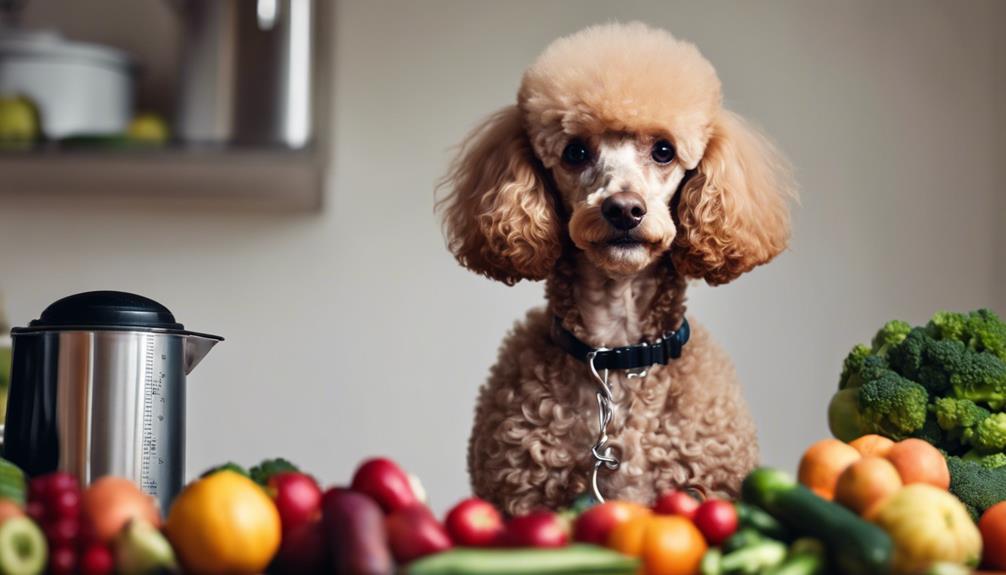
Implementing precise portion control is crucial for effectively managing the weight of your Poodle and ensuring their optimal health. Portion control plays a vital role in preventing obesity and maintaining a healthy weight in Poodles. By accurately measuring meals, you can prevent both overfeeding and underfeeding, ensuring that your Poodle receives the right amount of nutrients for their size and activity level. Monitoring portion sizes is key to preventing unnoticed weight gain and supporting overall well-being in your furry companion.
Proper portioning is essential for balanced nutrition and weight management in Poodles. Following professional guidelines for portion control can help you provide the best care for your Poodle. By paying attention to portion sizes and adjusting them according to your Poodle's needs, you can help them stay healthy and active. Remember, portion control is not just about the quantity of food but also about the quality and balance of nutrients your Poodle receives.
Dietary Needs for Poodle Puppies
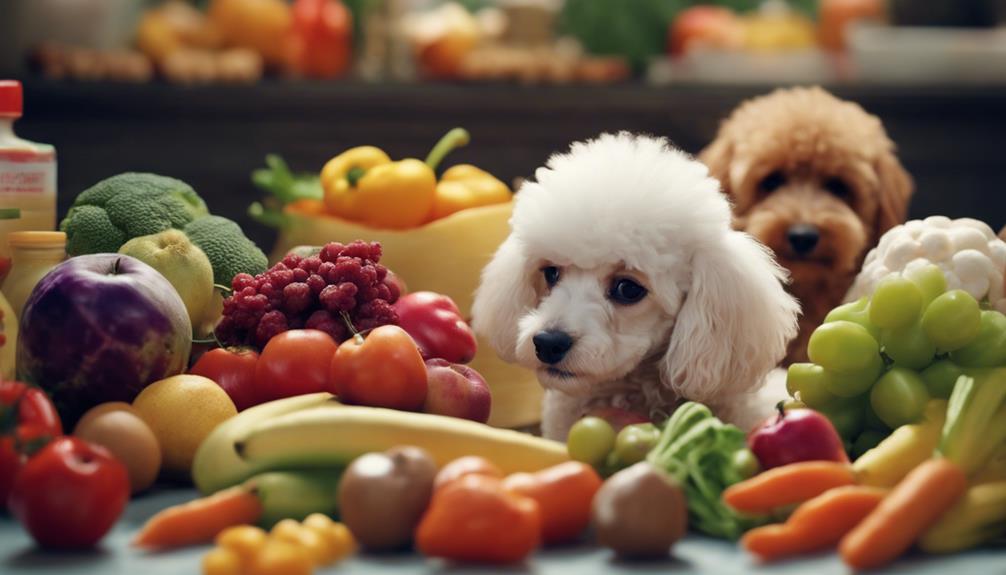
What specific dietary requirements are crucial for supporting the optimal growth and development of Poodle puppies? Poodle puppies have specific nutritional needs during their growth stage to ensure they develop into healthy adult dogs. Here are key dietary considerations for Poodle puppies:
- Rich Sources of Protein: Poodle puppies require high-quality protein to support muscle development and overall growth.
- Fat: Healthy fats are essential for providing energy and supporting the development of the brain and nervous system in Poodle puppies.
- Small, Frequent Meals: Feeding Poodle puppies small, frequent meals throughout the day helps maintain their high energy levels and supports proper growth.
- Puppy Formulas: Specialized puppy formulas are designed to provide the necessary nutrients tailored for the growth and development needs of Poodle puppies.
Ensuring Poodle puppies receive proper nutrition is vital for their long-term health and well-being. Consulting a veterinarian for guidance on the best diet and feeding schedule for Poodle puppies can help you provide optimal care during this critical stage of their development.
Wet Vs. Dry Food for Poodles

When considering the optimal diet for your Poodle, the choice between wet and dry food plays a significant role in their overall health and well-being. Wet dog food is more hydrating and palatable for Poodles, but it can sometimes lead to digestive issues. On the other hand, dry dog food is recommended for dental health in Poodles, helping to maintain oral hygiene. To provide a balanced diet, mixing both wet and dry food can offer varied nutrition while catering to your Poodle's preferences. Wet food is easier on the stomach and teeth of Poodles, while dry food is more convenient for feeding. It is crucial to consider your Poodle's health needs and preferences when deciding between wet or dry food options to ensure they receive the necessary nutritional requirements. Following feeding guidelines and understanding the benefits of each type of food can help in creating an optimal Poodle diet and nutrition plan.
Poodle Treat Selection Guide
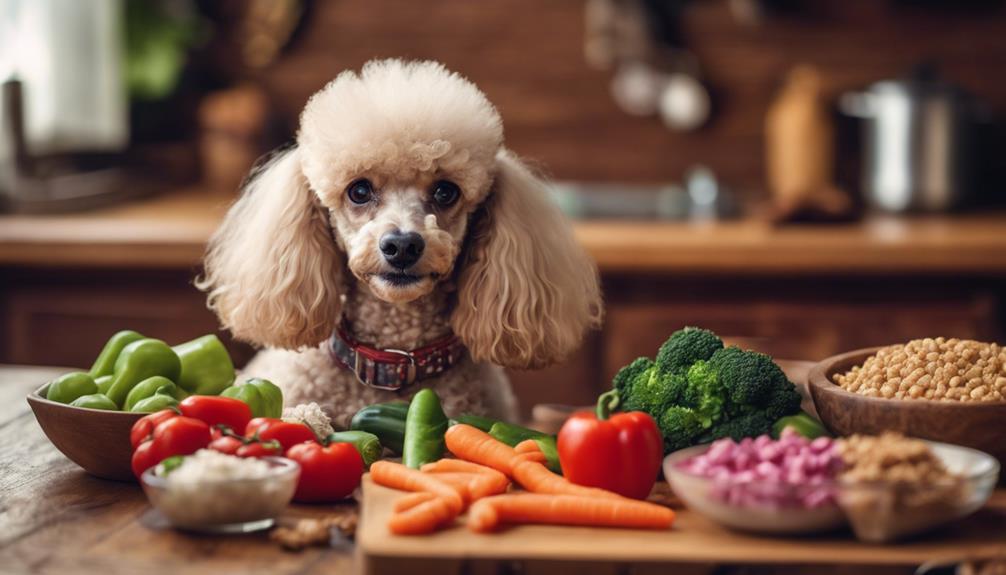
Selecting treats rich in quality ingredients like real meat or vegetables is crucial for supporting your Poodle's health and digestion. When choosing the right treats for your Poodle, consider the following:
- Quality Ingredients: Opt for treats made with real meat or vegetables to ensure your Poodle receives essential nutrients without unnecessary fillers.
- Free of Artificial Additives: Avoid treats with artificial additives, colors, and preservatives to prevent potential sensitivities or allergies in your Poodle.
- Omega-3 and Omega-6 Fatty Acids**: Look for treats rich in Omega-3 and Omega-6 fatty acids to promote healthy skin and a shiny coat for your Poodle.
- Size and Texture**: Select treats that are the appropriate size and texture for your Poodle's breed and age to prevent choking hazards and dental issues.
Transitioning Poodles to New Diets
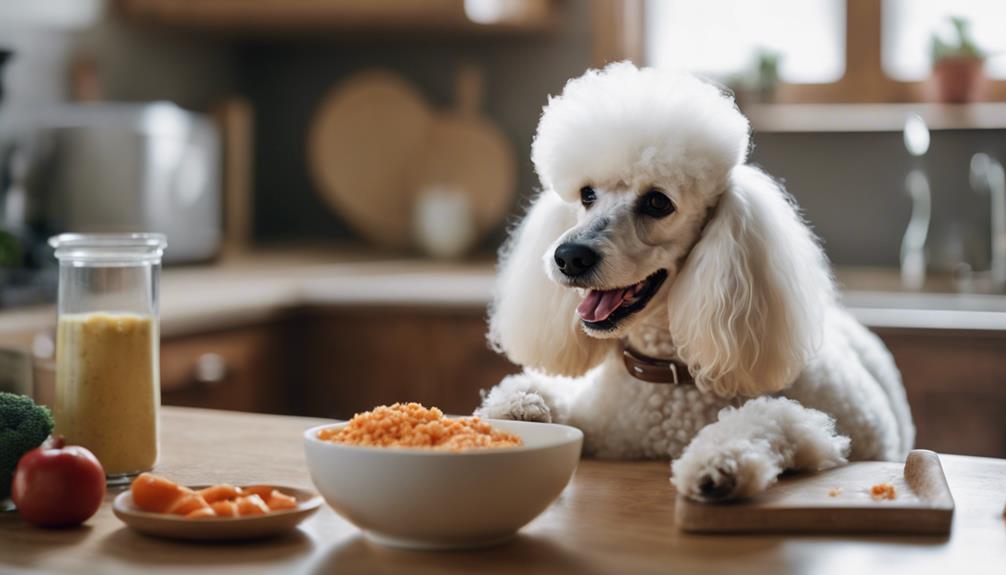
When transitioning your Poodle to a new diet, remember to make gradual changes over 7-10 days to minimize digestive issues. It's essential to monitor your Poodle's response to the new food during this period to catch any adverse reactions early. Consulting with a veterinarian before the transition can provide valuable guidance on the best approach for your Poodle's specific needs.
Smooth Diet Transitions
To ensure optimal digestive health and well-being in Poodles, it is crucial to gradually transition them to new diets over a period of 7-10 days. This slow adjustment helps prevent digestive upsets that can occur with sudden food changes. Here are some key steps to facilitate a smooth diet transition for your Poodle:
- Slowly Mix Old and New Food: Gradually increasing the proportion of new food while decreasing the old food helps your Poodle adjust to the dietary changes.
- Monitor Your Poodle's Response: Keep an eye on how your Poodle is responding to the new diet to ensure they are adapting well.
- Avoid Sudden Changes: Abrupt diet transitions can lead to gastrointestinal issues, so consistency is key.
- Support Digestive Health: Consistent transitioning supports your Poodle's digestive system and overall well-being.
Monitoring Appetite Changes
During the process of transitioning your Poodle to a new diet, carefully monitoring appetite changes is crucial to ensure they are consuming an adequate amount of food. Look for signs of reluctance or avoidance of food, as sudden changes in appetite could signal digestive issues or food aversion. Gradually introducing the new diet can help prevent these problems. Below is a table summarizing key points related to monitoring appetite changes when transitioning your Poodle to a new diet:
| Monitoring Appetite Changes |
|---|
| Look for signs of reluctance or avoidance of food |
| Note sudden changes in appetite |
| Consult with a veterinarian if issues persist |
Consulting Vet Beforehand
Before transitioning your Poodle to a new diet, consulting a veterinarian is essential to ensure personalized recommendations tailored to your dog's individual health needs. This professional advice is crucial for a successful transition, considering factors like allergies, sensitivities, and nutritional requirements. Here are 4 key reasons why veterinary consultation is vital:
- Vets can provide guidance on the gradual transition process to prevent digestive issues and ensure a smooth adjustment.
- Professional advice helps in monitoring your Poodle's response to the new diet, ensuring optimal health and well-being.
- Vets may recommend specific dietary changes or supplements based on your Poodle's age, weight, activity level, and any existing health conditions.
- Veterinary consultation ensures that the transition is done safely and effectively, promoting your Poodle's overall health and happiness.
Decoding Dog Food Labels
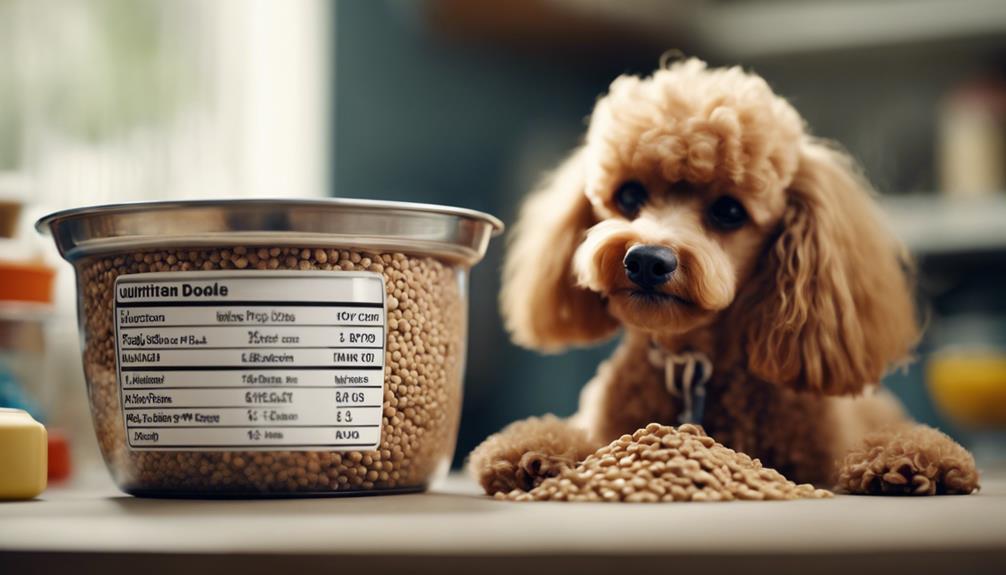
When analyzing dog food labels, prioritize identifying named protein sources like 'chicken' or 'beef' as the leading ingredient to ensure optimal nutrition for your Poodle. Quality proteins are essential for a balanced diet tailored to your Poodle's specific health concerns. Look for ingredients listed by weight, with the primary protein source ideally named, avoiding ambiguous terms such as 'meat by-products' or 'animal digest'. Ensure the label carries an AAFCO statement indicating complete and balanced nutrition to guarantee your Poodle receives the necessary vitamins and minerals. Understanding how to interpret food labels empowers you to make informed decisions when selecting your Poodle's meals. By choosing foods with named proteins as the main ingredient and avoiding vague terms, you contribute to providing a well-rounded diet that supports your Poodle's health and well-being. Remember, the order and quality of ingredients play a crucial role in crafting balanced meals for your furry companion.
Homemade Diets for Poodles
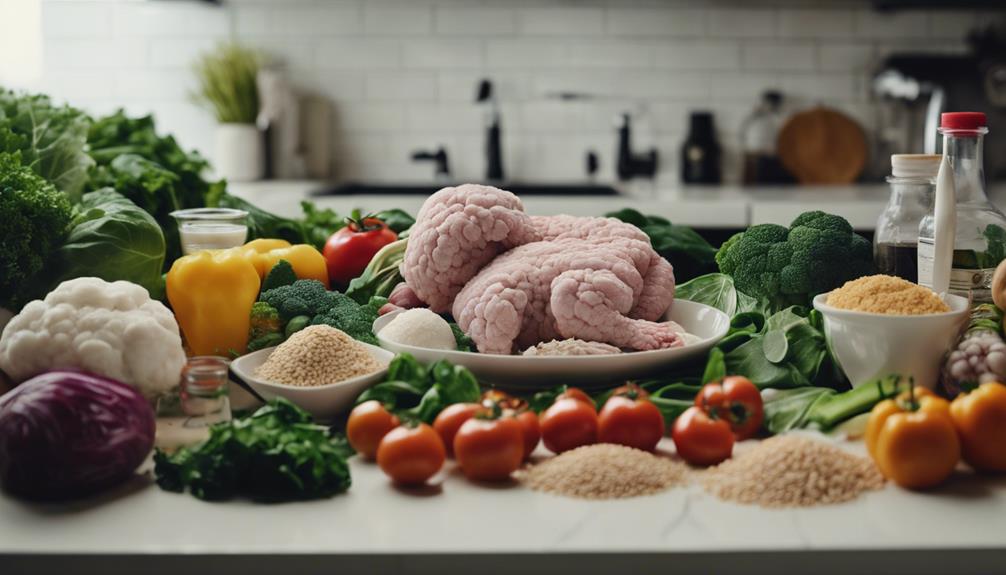
For Poodles, crafting a well-balanced homemade diet tailored to their specific nutritional requirements is crucial for supporting overall health and well-being. When considering homemade diets for your Poodle, keep in mind the following:
- High-Quality Proteins: Poodles benefit from proteins like lean meats (chicken, turkey) or fish, which aid in muscle maintenance and overall health.
- Healthy Fats: Including sources of healthy fats such as salmon oil or flaxseed can help maintain a shiny coat and support cognitive function.
- Complex Carbohydrates: Opt for whole grains like brown rice or quinoa to provide sustained energy levels and essential nutrients.
- Individual Needs: Tailor the homemade diet to your Poodle's specific needs, considering factors like age, activity level, and any existing health conditions.
Homemade diets for Poodles offer the advantage of avoiding artificial additives commonly found in commercial dog foods, promoting better digestion and overall well-being. Remember to consult with a veterinarian or canine nutritionist to ensure the homemade diet meets all of your Poodle's dietary requirements.
Hydration Tips for Poodles
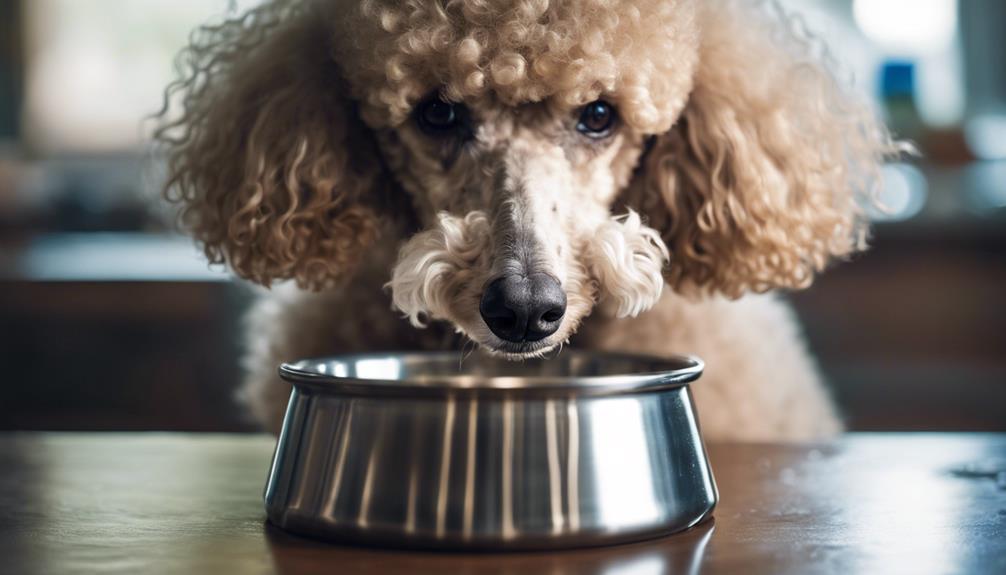
Crafting a well-hydrated diet is essential for maintaining the health and vitality of your Poodle. Proper hydration is crucial for preventing health issues such as urinary tract infections and kidney problems. Make sure your Poodle has access to clean, fresh water at all times. Monitor their water intake, especially during hot weather or increased activity levels. You can increase moisture content in their diet by adding water to dry food. Consider incorporating wet food or water-rich fruits and vegetables into their meals to help them stay hydrated.
| Hydration Tips for Poodles | |
|---|---|
| Tip 1 | Provide access to fresh water at all times. |
| Tip 2 | Monitor water intake, especially in hot weather or during increased activity. |
| Tip 3 | Add water to dry food to increase moisture content. |
| Tip 4 | Consider wet food or water-rich fruits and vegetables for hydration. |
Health Issues Addressed by Poodle Diet
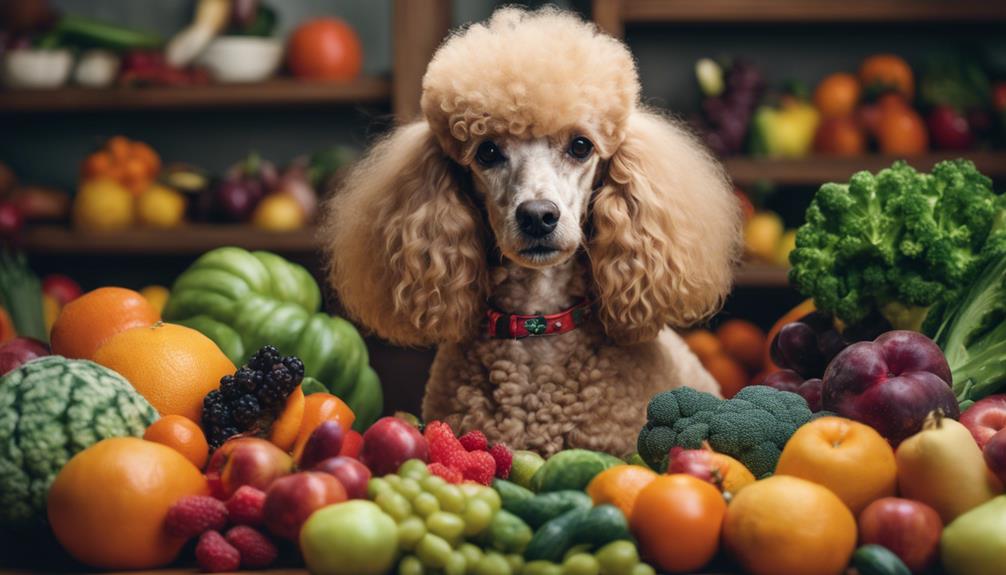
Promoting optimal health in Poodles through a well-balanced and tailored diet is essential in addressing various common health issues they may encounter. Here are four key points to consider when focusing on health problems addressed by a Poodle's diet:
- Skin Allergies and Digestive Problems: Proper nutrition can help prevent common Poodle health issues like skin allergies and digestive problems by ensuring the diet is free from allergens and irritants.
- Balanced Diet and Essential Nutrients: Balanced diets rich in essential nutrients support Poodles' immune system and overall well-being, reducing the risk of skin and digestive complications.
- Healthy Skin and Coat: High-quality proteins and fats are essential for maintaining healthy skin and coat, which in turn can reduce the risk of dermatological issues in Poodles.
- Joint Health and Tailored Diets: Omega-3 and Omega-6 fatty acids play a crucial role in supporting Poodles' joint health and mobility. Tailored diets can address specific health concerns like obesity, food sensitivities, and joint issues in Poodles. By focusing on these aspects, you can help ensure your Poodle leads a healthy and happy life.
Frequently Asked Questions
What Are the Nutritional Needs of a Poodle?
To meet a Poodle's needs, ensure protein requirements are met with real meats. Offer a balanced diet rich in essential fats, vitamins, and minerals for optimal health. Consider food allergies, weight management, and digestive health to provide essential nutrients.
What Role Does Nutrition Play in Dogs Health?
In maintaining a dog's health, nutrition is paramount. Food allergies, digestive health, weight management, joint health, skin and coat, dental care, and energy levels are all influenced by what your furry companion consumes daily.
What Is the Health of a Poodle?
To maintain your Poodle's health, focus on a balanced diet, exercise routine, grooming tips, mental stimulation, weight management, dental care, socialization skills, and training techniques. These elements contribute to a happy and healthy Poodle.
How Do You Keep a Standard Poodle Healthy?
To keep a Standard Poodle healthy, maintain a consistent exercise routine, provide mental stimulation, follow proper grooming tips, use effective training techniques, enhance socialization skills, prioritize preventative healthcare, and manage weight effectively.
Conclusion
In conclusion, ensuring your Poodle receives proper nutrition is paramount for their overall health and well-being. By providing a balanced diet rich in essential nutrients like proteins, healthy fats, carbohydrates, vitamins, and minerals, you can help prevent skin issues, support digestion, and promote vitality in your furry companion. Remember, you are what you eat, so choose premium dog food tailored to your Poodle's specific needs to keep them "in the pink" and thriving.
